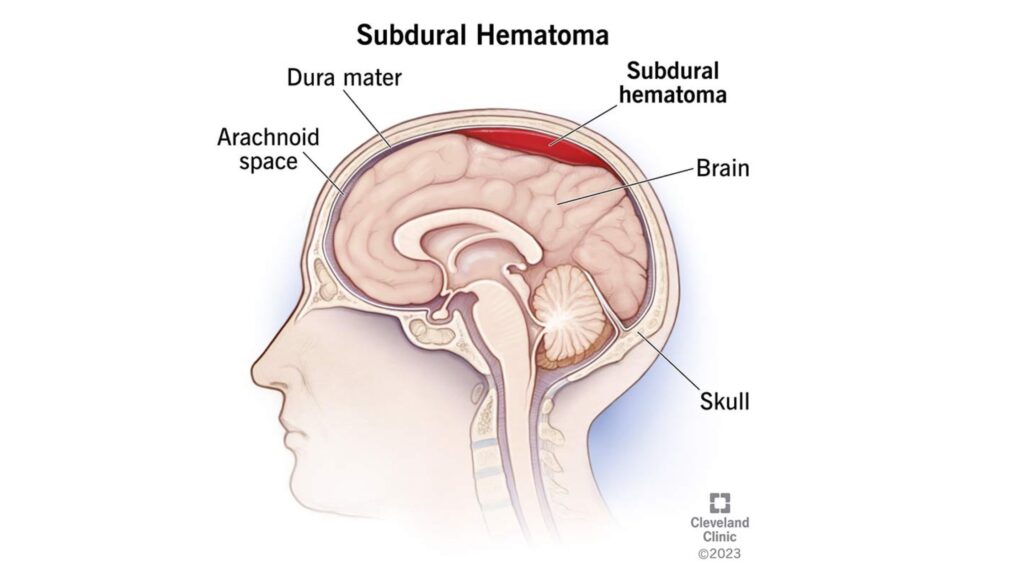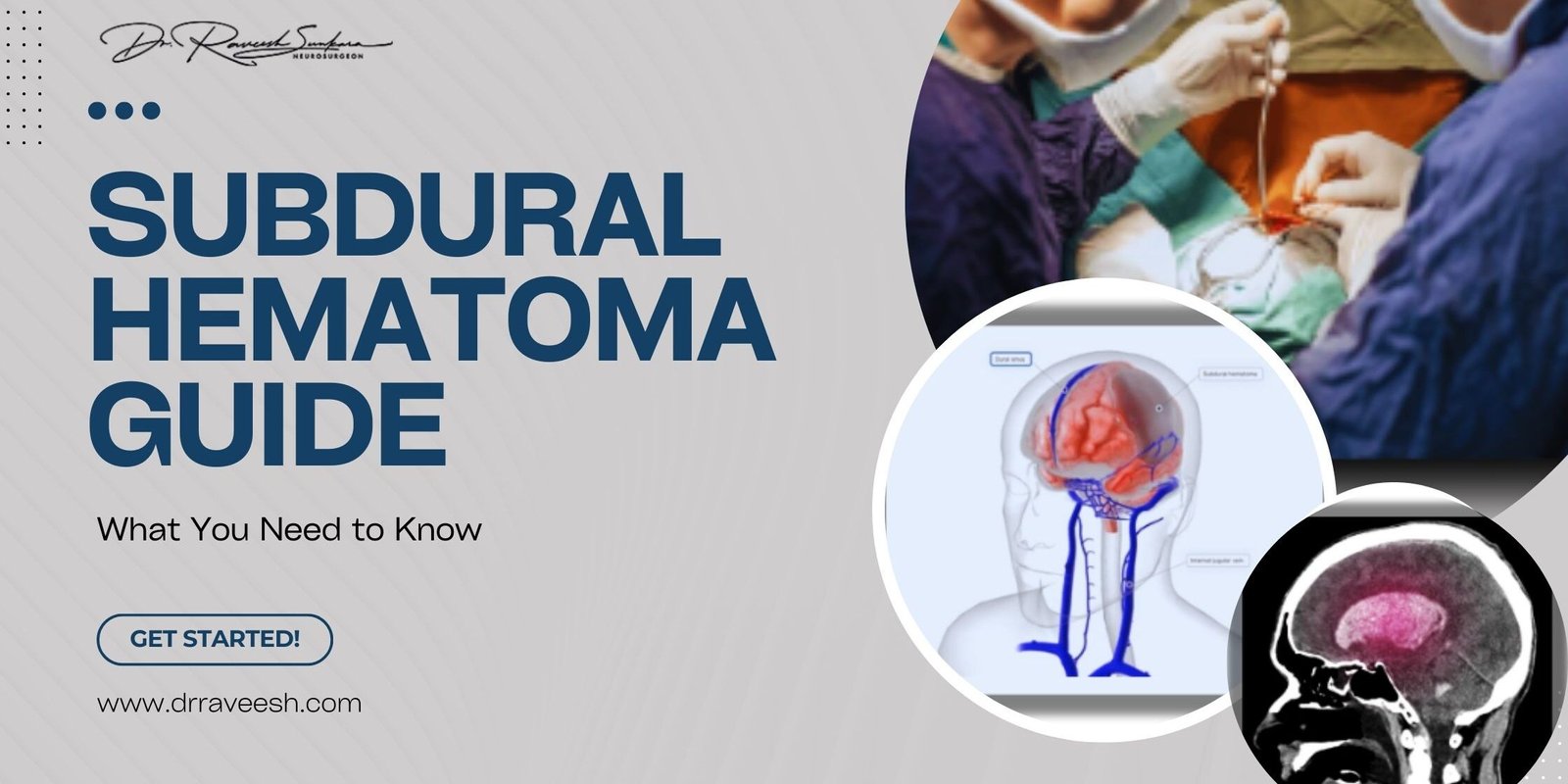A subdural hematoma is a very serious health issue that needs quick attention and special treatment. This manual provides an overall view of subdural hematoma, including its causes, symptoms, diagnosis, treatment methods and recovery process. Knowing this disease will help you identify early signs and get the best care possible, perhaps even from the best neurosurgeon in Hyderabad.
Table of Contents
What is a Subdural Hematoma?
A subdural hematoma happens when blood gathers between the dura mater (the outer protective covering of the brain) and the brain itself. Usually due to head injuries, which cause veins on the surface of the brain to tear, thus leading to bleeding; this condition can be fatal if not treated promptly because accumulated blood may compress brain tissue, thereby causing severe neurological damage or death.
Types of Subdural Hematomas
1) Acute Subdural Hematoma: This type occurs shortly after a severe head injury and is dangerous because there is rapid bleeding as well as pressure on the brain.
2) Subacute Subdural Hematoma: Symptoms appear days to weeks after injury. The bleeding is slower but still requires urgent medical attention.
3) Chronic Subdural Hematoma: It takes place over a period of weeks or months after a slight injury to the head which is common among old people or those who use anticoagulants frequently
Causes of Subdural Hematoma

The primary cause for sub-dural haematomas is head injuries that may be due to:
- Falls
- Car accidents
- Sports injuries
- Physical assaults
Other risk factors include:
- Anticoagulant or antiplatelet medication
- Heavy alcohol use
- Age (older adults are more susceptible)
- Previous head injuries
Symptoms of Subdural Hematoma
Symptoms depend on the severity and type of haematoma, but generally they include:
- Severe headache
- Vomiting and nausea
- Confusion or altered mental status
- Dizziness and balance issues
- Seizures
- Weakness or numbness on one side of the body
- Slurred speech
- Vision problems
- Loss of consciousness
Identifying the problem
When it comes to diagnosing a subdural hematoma, a lot is involved; the physician is mandated to take a history of the incident and do a physical examination. Imaging studies are very useful in order to confirm the diagnosis and other signs of the hematoma. The main diagnostic tools are:
- CT Scan (Computed Tomography): Provides detailed images of the brain and can quickly show the presence of blood between the skull & cerebral cortex.
- MRI (Magnetic Resonance Imaging): More detailed than CT scan, especially when assessing chronic subdural hematomas.
- Neurological Exam: Testing reflexes, muscle strength, sensory perception, cognitive function, etc., to determine the amount of brain damage done so far.
Treatment Options
Treatment for sub-dural haematomas depends on their size, severity, as well as patient’s overall health status. The main aim is to relieve brain compression and stop bleeding. These include:
Observation
Immediate intervention may not be necessary for small asymptomatic sub-dural haematomas, which frequent imaging studies should closely monitor to ensure no increase in the size of this condition over time.
Medications
Symptoms like headaches can be managed using drugs, while seizures caused by these conditions can also be controlled through medication. Reversing effects of blood thinners may prevent additional bleeding in some cases where patients are under such treatment.
Surgery
Larger hematomas or those causing significant symptoms often require surgical intervention. There are two main surgeries:
- Burr Hole Drainage: This minimally invasive procedure involves making a small hole
- Craniotomy: A more extensive surgery where part of the skull is removed so that the hematoma can be accessed and taken out. It is usually done in severe cases.
Recovery and Rehabilitation
Recovering from a subdural hematoma can take a long time and may need comprehensive treatment. How fast and to what extent someone recovers mainly depends on how severe their condition is. Here are some features of recovery:
Hospitalization and Initial Care
Intensive care may be required for patients with severe subdural hematomas to manage symptoms and monitor brain function. During this time, continuous neurological assessments might be done, and life-support measures could be used.
Rehabilitation
This part of the recuperation process tries to bring back lost abilities and enhance the overall quality of one’s life. It can include:
- Physical Therapy: This is done in order to regain strength, coordination, and mobility.
- Occupational Therapy: It helps with everyday living tasks and encourages self-reliance.
- Speech and Language Therapy: This deals with any problems related to communication that may arise.
- Cognitive Therapy: Designed to improve memory as well as problem-solving skills, among other mental functions.
Long-term Care
There are patients who may require prolonged care. That’s why it’s necessary for them to see their neurologist or neurosurgeon after a discharge from the hospital so that they can monitor how well they’re responding to treatment and take note of any issues which may come up during this time.
Choosing the Best Neurosurgeon in Hyderabad
A good selection of a neurosurgeon plays an important role towards successful treatment outcomes after suffering from sub-dural haemorrhage; therefore, careful consideration should be given when choosing the best neurosurgeon in Hyderabad. Such a doctor should be well experienced with handling various types of traumatic brain injuries and have knowledge about the most recent surgical procedures. Multidisciplinary teamwork involving neurologists, physical therapists, along other professionals could ensure holistic care delivery depending on the patient’s needs.
Conclusion
Subdural hematoma is a grave illness which requires timely diagnosis as well as treatment; you can manage it better if you understand its causes, symptoms and available treatment options. Therefore, once anyone sustains a head injury and shows signs related to this condition, he or she must seek immediate medical attention. In addition, consulting the best neurosurgeon in Hyderabad will guarantee the highest level of service provision, thereby increasing chances for a complete recovery process.







